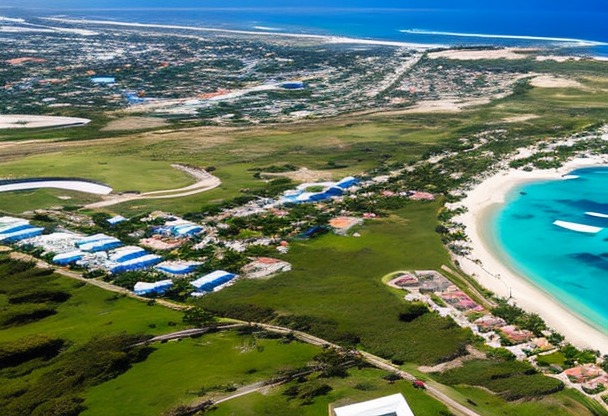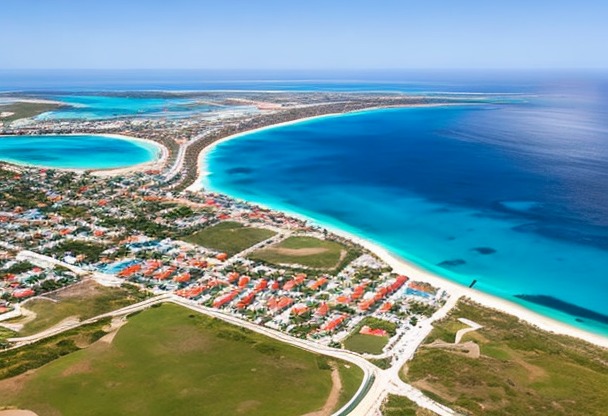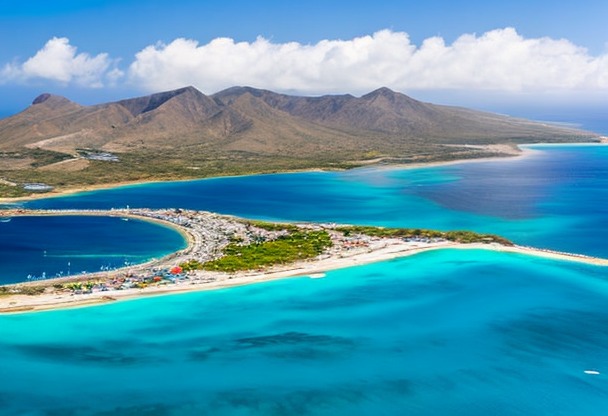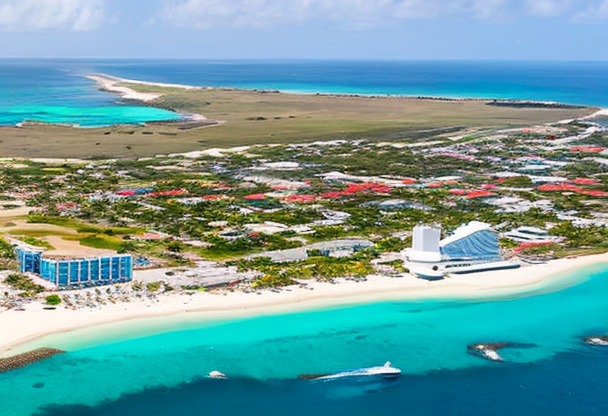WHEN TO TRAVEL TO Aruba
Choosing the right time for your trip to Aruba can make all the difference. It's important to consider weather elements, seasonal events and busy tourist periods to maximize your travel experience.

Location
Climate
Tourist seasons in Aruba
To make the most of your stay, it's essential to choose the right period to go away. Tourist seasons are generally divided into three categories:- Low season From May to November, this is the period least frequented by tourists,
- Mid season April and December, moderate affluence,
- High season January to March, the peak season when prices are highest.
Advantages and disadvantages of low season
The low season offers several advantages for those wishing to discover Aruba without too many people. In fact, temperatures remain pleasant, hovering around 28°CThe sun is always shining. What's more, prices for accommodation and activities are generally lower during this period. However, it's important to note that the low season also corresponds to the rainy seasonwhich generally runs from October to January. Rainfall, however, is moderate and short-lived, and will not have a significant impact on your stay.Advantages and disadvantages of high season
The high season is marked by an increase in tourist numbers, leading to higher prices for accommodation and activities. Nevertheless, this is the ideal time to enjoy the sun and warmth, with temperatures reaching 32°C and optimal sunshine. It's also worth noting that the high season coincides with several major cultural events and public holidays, providing a lively, festive atmosphere on the island.Major cultural events in Aruba
Aruba is rich in cultural and festive events throughout the year. Here are a few not to be missed:- Aruba Carnival Celebrated between January and February, this colorful event features costume parades, concerts and traditional dances,
- The Soualiga Festival Aruba Festival: in May, this festival celebrates Aruban culture and history with exhibitions, shows and entertainment for the whole family,
- Día di San Juan St. John the Baptist: on June 24, this traditional festival honors St. John the Baptist with processions, bonfires and folk dances,
- The Aruba International Film Festival This prestigious film event, usually held in October, attracts international directors and actors.
Public holidays in Aruba
In addition to cultural events, it's useful to be aware of local public holidays in order to anticipate closures of shops and services:- New Year's Day January 1,
- Spring Festival The second Monday in March,
- King's Day April 27, celebrating the birthday of King Willem-Alexander of the Netherlands,
- Labor Day May 1st,
- Dia di Himno y Bandera March 18, national holiday honoring the Aruban anthem and flag,
- Ascension of Jesus Christ 40 days after Easter,
- Assumption August 15,
- Dutch Independence Day September 5,
- Discover Aruba October 12, celebrating the discovery of the island by Christopher Columbus,
- Christmas December 25 and 26.
Insurance

Your credit card does not cover you in all situations, that is whyIt is essential to take out insurance before you leave to avoid any unpleasant surprises. If you need to see a doctor or be hospitalized, in some countries, medical costs are very high and you will then find yourself having to pay several thousand euros.
Our partner Chapka Insurance proposes the contract CAP ASSISTANCE 24/24 with many essential guarantees.


Flights

Your flight has been cancelled or delayed ?
You may be eligible for a compensation of up to €600 ! For this, lawyers are responsible for handling your claim with the airline and are only paid when the reimbursement is effective.
In conclusion, no financial risk for you, only advantages!
Immigration statistics for Aruba
Like many popular tourist destinations, Aruba experiences a constant flow of immigrants who come to settle here, either temporarily or permanently. According to data published by the Aruban government, here are some notable immigration trends:- The majority of immigrants to Aruba come from neighboring countries such as Colombia, the Dominican Republic and Venezuela.
- The number of immigrants from Europe and North America has also increased in recent years, particularly among citizens of the Netherlands and the United States.
- Around 20 % of Aruba's population are immigrants, making it one of the highest proportions in the Caribbean region.
Most popular visas in Aruba
In order to stay legally in Aruba, foreign nationals are generally required to obtain an appropriate visa. Several types of visa are available for visitors, depending on the length and purpose of their stay:- Tourist visa : This is the type of visa most commonly requested by international travelers wishing to visit Aruba for a period of up to 30 days. Citizens of certain countries, such as the United States and members of the European Union, do not need a visa to enter Aruba as tourists.
- Business visa: This visa is intended for people visiting Aruba for business reasons, such as attending meetings, conferences or training courses. The duration of this visa may vary according to the nature of the planned business activity.
- Work visa: Immigrants wishing to work in Aruba must obtain a work visa before starting work. The procedure for obtaining this visa generally involves an application to Aruba's Ministry of Social Affairs and Employment, as well as a criminal and medical background check on the applicant.
- Resident visa : People wishing to settle in Aruba permanently can apply for a residence visa. This type of visa generally requires proof of sufficient income and other documents, such as a birth certificate and valid passport.
International tourism figures for Aruba
The tourism sector is one of Aruba's main economic drivers, contributing almost 50 % of its gross domestic product (GDP). International tourism figures show steady growth over the years, with :- More than 1 million international visitors come to Aruba every year, including around 60 % from the United States.
- An average annual increase of 5 % in the number of tourists between 2010 and 2019.
- The high proportion of cruise ship arrivals, accounting for nearly 30 % of total international visitors.
Recent tourism trends in Aruba
While Aruba's traditional tourism market remains primarily focused on visitors from the USA and Canada, new trends are also emerging:- An increase in the number of European tourists, particularly from the Netherlands, the UK and Germany.
- Growing interest in ecological and cultural activities, such as discovering local biodiversity and taking part in traditional craft workshops.
- The growing popularity of alternative accommodations, such as private vacation rentals and eco-responsible establishments.


